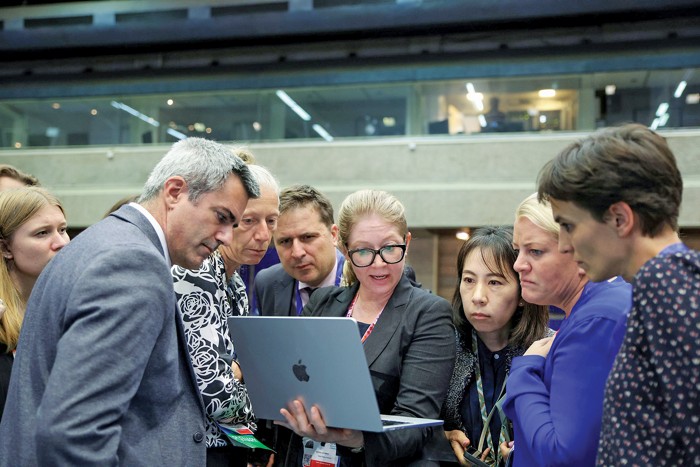Advertisement
Grab your lab coat. Let's get started
Welcome!
Welcome!
Create an account below to get 6 C&EN articles per month, receive newsletters and more - all free.
It seems this is your first time logging in online. Please enter the following information to continue.
As an ACS member you automatically get access to this site. All we need is few more details to create your reading experience.
Not you? Sign in with a different account.
Not you? Sign in with a different account.
ERROR 1
ERROR 1
ERROR 2
ERROR 2
ERROR 2
ERROR 2
ERROR 2
Password and Confirm password must match.
If you have an ACS member number, please enter it here so we can link this account to your membership. (optional)
ERROR 2
ACS values your privacy. By submitting your information, you are gaining access to C&EN and subscribing to our weekly newsletter. We use the information you provide to make your reading experience better, and we will never sell your data to third party members.
Pollution
Frustration finishes out UN plastics meeting
Treaty on plastic pollution hits bumps but continues to lurch forward
by Leigh Krietsch Boerner
November 21, 2023
| A version of this story appeared in
Volume 101, Issue 39

As negotiators head home after the third United Nations Intergovernmental Negotiating Committee on Plastic Pollution (INC-3) meeting, some are muttering under their breath. Participants did advance the treaty’s ultimate goal—ending plastic pollution—during the session, held from Nov. 13 to 19 in Nairobi, Kenya. But for some, that progress is overshadowed by negotiation breakdowns on the last day.
Disagreements flared over how much, and even if, to reduce plastic production, an idea that was displayed prominently in the zero draft of the treaty, published by the UN in September.
Plastic-producing countries and industries argue that production does not have anything to do with pollution, says Björn Beeler, international coordinator for the International Pollutants Elimination Network (IPEN), an advocacy group. “It’s an illogical argument because when you produce more plastic, you have more plastic waste,” he says. The meeting ended with more proposed amendments to the zero draft and no official direction for the scope of the work before the next session, scheduled for April 2024 in Ottawa, Ontario.
“It was a baby step forward and a missed opportunity to make progress on the supposed timeline,” Beeler says. The negotiations were tense, but overall the treaty is progressing, he says. “Our view is not doom and gloom. This is how meetings go when you have high stakes.”
Global Partners for Plastics Circularity (GPPC), a coalition of plastics industry groups, concurs that INC-3 moved the conversation toward an effective and practical plastics agreement. “The GPPC commend government negotiators for improving the Zero Draft by adding elements needed to accomplish the agreement’s intent—ending plastic pollution,” Benny Mermans, chair of the World Plastics Council, says in a statement.
INC-3 was the third of five meetings organized to hammer out an international, legally binding treaty to curb plastic pollution. Negotiators plan to reach consensus by the end of 2024 at INC-5, which will take place in Seoul, South Korea, next November. However, some organizations doubt this timeline.
“We were fully expecting that we were going to do a first read of the zero draft, and then on a second read be going line by line and doing editorial changes,” says Jessica Roff, US and Canada program manager for plastics and petrochemicals with the Global Alliance for Incinerator Alternatives (GAIA). Instead of walking away with a UN okay to work on the first draft of the treaty, participants will have another version of the zero draft to work through, Roff says. And that document will likely be about three times the size it started at, she says.
But the draft has moved forward, Beeler says. “There were 500 submissions to the treaty during the week.” The draft ballooned, but this is a normal process, he says.
One of the main concerns was about how to fund the eventual treaty. “The global south wants to have that conversation immediately,” Beeler says. “But developed countries don’t want to commit to [financing] at all. Before they fund this thing, they want to know what they’re funding.”
Another sticking point is defining the life cycle of plastic, which determines what entities are responsible for creating pollution. Some organizations, such as GAIA, say the life cycle starts when the carbon source comes out of the ground, Roff says. “Oil countries are saying that it’s once [plastic] becomes waste,” Beeler says. “A more moderate argument is that once you have carbon and make plastic, then that leads to pollution.”
It’s now up to the chairs of the meeting to sort through the submissions and create an updated copy of the zero draft ahead of INC-4, Roff says. “We’re an entire session behind,” she says. “We did not accomplish many of the working parts of the document that were supposed to get done.”
The process is chaotic, Beeler says, but the treaty will get there in the end. “The first draft is coming, but it’s like honey that’s been in the fridge,” he says. “It’s very slow.”



Join the conversation
Contact the reporter
Submit a Letter to the Editor for publication
Engage with us on Twitter